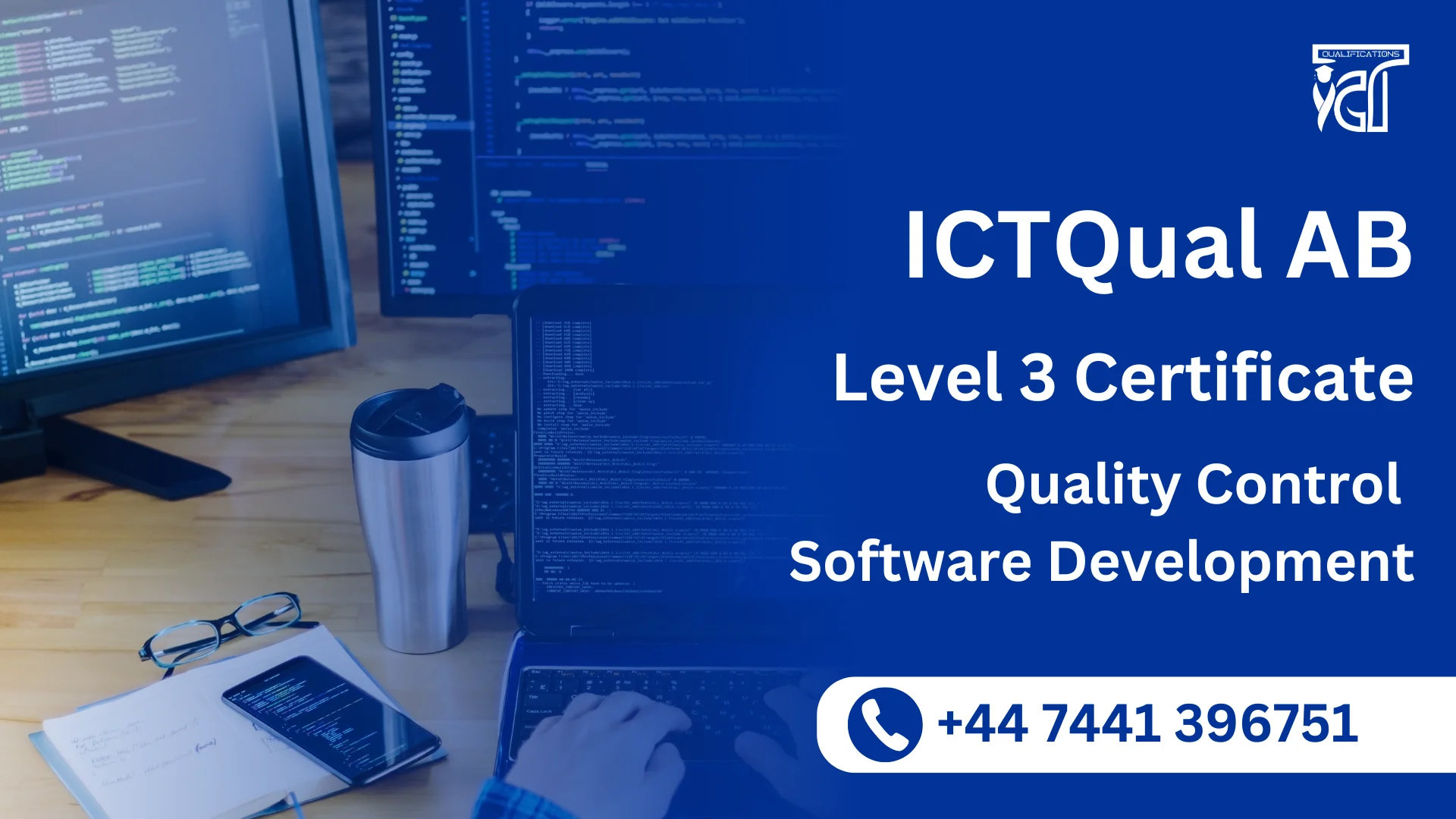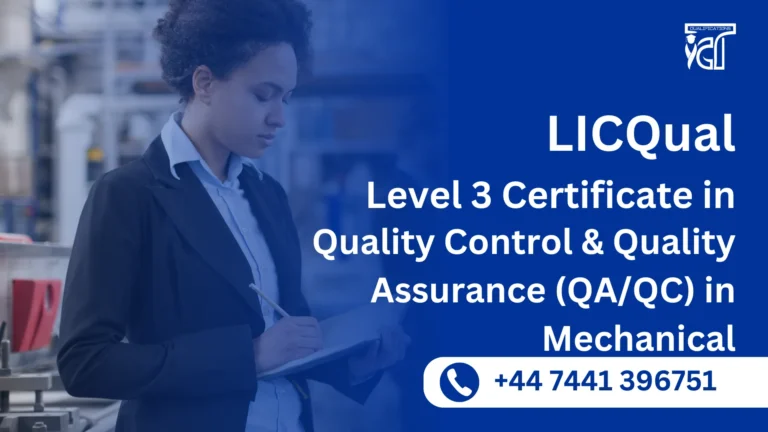The ICTQual AB Level 3 Certificate in Quality Control Software Development is a foundational program designed to equip learners with essential skills in quality assurance practices within the software development life cycle. This course introduces the principles, tools, and methodologies used to ensure that software products meet high standards of quality, performance, functionality, and security before they are released.
In today’s fast-paced and competitive tech industry, software quality is critical to user satisfaction and business success. This course provides learners with a solid understanding of software testing fundamentals, including test planning, test execution, bug reporting, and quality metrics. Students will also explore industry-standard tools and techniques such as manual testing, automated testing basics, version control systems, and software development methodologies like Agile and DevOps.
Whether you’re aiming to begin a career in software testing or enhance your understanding of quality assurance in development, this certificate will give you the practical knowledge and confidence to contribute effectively to any software development team. It serves as a stepping stone toward roles such as Quality Assurance (QA) Tester, Software Test Analyst, or Junior QA Engineer.
ICTQual AB Level 3 Certificate in Quality Control Software Development
This qualification, the ICTQual AB Level 3 Certificate in Quality Control Software Development, consists of 3 mandatory units.
- Fundamentals of Software Quality Assurance
- Software Development Life Cycle (SDLC) and Testing Methods
- Defect Tracking and Reporting Systems
Learning Outcomes for the Study Units:
1. Fundamentals of Software Quality Assurance
- Understand the core principles and objectives of software quality assurance (SQA).
- Identify the roles and responsibilities of QA professionals within the development process.
- Recognize the importance of quality control in software project success.
- Apply basic quality assurance concepts to real-world software environments.
2. Software Development Life Cycle (SDLC) and Testing Methods
- Explain each phase of the Software Development Life Cycle (SDLC).
- Compare different SDLC models, including Agile, Waterfall, and V-Model.
- Understand the integration of quality control and testing in each SDLC stage.
- Identify and apply basic manual testing techniques aligned with project goals.
3. Defect Tracking and Reporting Systems
- Understand the lifecycle of a software defect from discovery to resolution.
- Use defect tracking tools to document, categorize, and prioritize bugs.
- Generate professional defect reports for development and QA teams.
- Communicate software issues clearly and effectively for corrective action.
Foundation in Software Quality Assurance (QA)
Gain a strong understanding of the core principles of quality control and assurance in software development, including testing processes, bug tracking, and performance evaluation.
Hands-On Testing Skills
Learn practical software testing methods such as functional testing, regression testing, and exploratory testing—essential skills for quality assurance roles.
Exposure to Industry Tools
Get familiar with widely-used QA tools such as JIRA, Selenium (introductory level), and version control systems (e.g., Git), enhancing your technical readiness for real-world environments.
Career Entry Point in Tech
Open doors to entry-level roles like QA Tester, Test Analyst, or Junior Software Quality Engineer, making this course an excellent starting point for non-developers entering the software field.
Aligned with Modern Development Practices
Understand how quality control fits within Agile, Scrum, and Develops environments, giving you insight into contemporary development workflows.
Boosts Analytical and Problem-Solving Skills
Strengthen your attention to detail, logical thinking, and problem-solving abilities—critical qualities for identifying, documenting, and communicating software issues effectively.
Improves Communication with Development Teams
Learn to document bugs, write test reports, and collaborate with developers and project managers to maintain high product standards.
Globally Recognized Qualification
Earn a professional certificate that demonstrates your competence in software quality control, helping you stand out in job applications or promotions.
Flexible Career Progression
Acts as a stepping stone to further qualifications in software testing, quality management, Develop, or software engineering, depending on your career goals.
Applicable Across Industries
Software QA skills are in demand across various sectors such as healthcare, finance, education, gaming, and e-commerce, offering wide-ranging employment opportunities.
Ideal Learner: ICTQual AB Level 3 Certificate in Quality Control Software Development
The ICTQual AB Level 3 Certificate in Quality Control Software Development is tailored for individuals who are keen to begin or transition into a career in software quality assurance. The ideal learner profile includes:
Beginners and Career Starters in Tech
Individuals with little to no prior experience in software development or testing who want to enter the tech industry through a quality assurance path.
Aspiring QA Testers and Analysts
Those aiming to become Quality Assurance Testers, Software Test Analysts, or Junior QA Engineers, and seeking a formal qualification to begin that journey.
Students with IT or Technical Backgrounds
Recent graduates or current students in fields like computer science, information technology, or engineering who want to specialize in quality control within software development.
Professionals Switching Careers
Career changers from non-IT fields who are detail-oriented, analytical, and interested in transitioning into software testing or tech-based quality control roles.
Support Staff in Tech Departments
Technical support personnel, documentation specialists, or junior developers who wish to expand their role by learning testing and QA practices.
Individuals Interested in Structured Learning
Learners who prefer a structured, certification-based route to gain job-ready skills in software QA without immediately diving into full-stack development or coding-intensive roles.
The ICTQual AB Level 3 Certificate in Quality Control Software Development is ideal for anyone motivated to join the software industry by mastering the core principles of quality control especially those who enjoy structured thinking, process improvement, and ensuring products meet high performance and reliability standards.
Entry Requirements
Register Now
Qualification Process
Qualification Process for the ICTQual AB Level 3 Certificate in Quality Control Software Development
- Self-Assessment:
Begin by evaluating your eligibility to ensure you meet the qualification requirements, including work experience, knowledge, and language proficiency. - Registration:
Complete your registration by submitting the required documents, including a scanned copy of a valid ID, and paying the registration fee. - Induction:
An assessor will conduct an induction to confirm your eligibility for the course and explain the evidence requirements. If you do not meet the criteria, your registration will be cancelled, and the fee will be refunded. - Assignments & Evidence Submission:
Provide all assignments and the necessary evidence based on the assessment criteria outlined in the course. If you are unsure of the required evidence, consult with the assessor for guidance on the type and nature of evidence needed. - Feedback and Revision:
The assessor will review your submitted evidence and provide feedback. Evidence that meets the criteria will be marked as “Criteria Met,” while any gaps will be identified. You will be asked to revise and resubmit if needed. - Competence Evidence:
Submit final evidence demonstrating that all learning outcomes have been met. This evidence will be marked as “Criteria Met” by the assessor once it is satisfactory. - Internal Quality Assurance (IQA):
The Internal Quality Assurance Verifier (IQA) will review your evidence to ensure consistency, quality, and compliance with standards. - External Verification:
The IQA will submit your portfolio to ICTQUAL AB External Quality Assurance Verifiers (EQA) for final confirmation. The EQA may contact you directly to verify the authenticity of your evidence. - Certification:
Upon successful completion of all checks, ICTQUAL AB will issue your official certificate, confirming that you have attained the ICTQual AB Level 3 Certificate in Quality Control Software Development.







